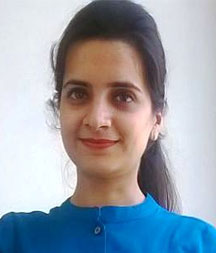
Dr. Navjot Kaur
B.P.T./M.E.P.N.
Healthy Food Guide is packed with information from dietitians to help you get healthy and stay that way. Our stories are designed to give you quick, simple facts that you can put into practice.
Healthy Food Guide is packed with information from dietitians to help you get healthy and stay that way. Our stories are designed to give you quick, simple facts that you can put into practice.
But have you ever wanted to know more about what we’ve talked about? Or wished we could spend more time on your specific issues? Seeing a dietitian can help fill in the gaps and provide you with ongoing individual care and eating plans.
What exactly is a dietitian?
Dietitians are trained in food and nutrition. They translate scientific nutrition information into practical advice, to help you make the right decision about what to eat.
Who sees a dietitian?
Many people think dietitians only help those wanting to lose weight. But, while they do deal with weight loss, dietitians can help people of all ages, genders, nationalities and financial circumstances. You might want more energy, to prevent or recover from illness, to ensure you have a healthy baby, to lose weight, gain weight, or cope with an allergy or intolerance, or just grow old gracefully – dietitians can help anyone.
What can they do?
Dietitians can provide you with a diet prescription. They can educate you and help you decide which foods are right for you right now and in the future. Dietitians can help you shop, give you meal ideas and recipes, and offer support and motivation when you need it. If they have further qualifications in exercise, psychology or diabetes education, they may also help you with exercise prescription, counselling and diabetes management.
What can’t they do?
Dietitians can’t make a medical diagnosis, take blood tests or prescribe drugs. However, they may make suggestions to your GP and provide advice about drug-nutrient interactions.
What happens when you see a dietitian?
At the first visit, expect to answer lots of questions about your lifestyle, medical history and what you eat, when, why and how much. After an assessment, the dietitian can offer you a plan to tackle your concerns. You may go away with some homework to do before your education sessions begin. Easy challenges at the end of each subsequent visit will help you achieve your ultimate goal.
How long would I need to see a dietitian for?
This depends on your condition – whether it is temporary or permanent – and what your personal circumstances are. When you explain what you need, ask the dietitian how long your individual program may take. Some dietitians offer group education sessions that cost less but mean greater contact in the long term.
Will they just tell me what I already know?
It’s possible, but what you have read or been told by well-meaning friends and family may be incorrect. Dietitians are trained to critique the latest research, combine it with what we already know and provide up-to-date advice. This is why advice will change as time goes on and we learn more about how the body works, and the role food plays in health and disease.
Tips for weight loss
Healthy weight is about balancing food intake with physical activity, and small changes can make a big difference. Learn about getting started with a healthy eating plan, foods to include, ways to cut calories and more tips for losing weight the healthy way.

